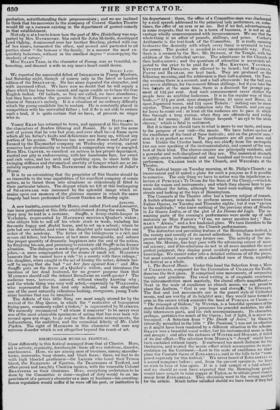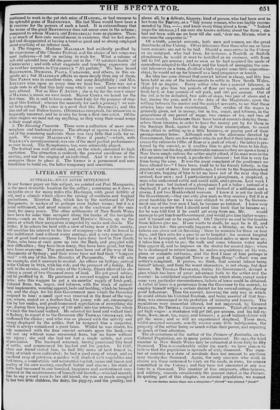BIRMINGHAM MUSICAL FESTIVAL.
How differently is this festival managed from that of Chester. Here, all is activity, regularity, forethought : there all was indolence, disorder, carelessness. Here, we are among men of business, among manufac- tories, ironworks, busy streets, and black faces : there, we had to do with high blooded gentlemen—the LEIGHS who boast their TUDOR blood, the EGERTONS of Egerton, the TRAFFORDS of Trafford, and other proud and haughty Cheshire squires, with the venerable Colonel BRANSTONE as their chairman. Here, everything undertaken to be done by the Committee is done—neglect of duty would be an im- -peachment of a person's character as a man of business—his counting- house reputation would suffer if he were off his post, or inattentive to his department : there, the -office of a Committee-man was discharged by a civil speech addressed to the principal lady performers, or, some_ times, the offer of an arm or an ice. But if we feel, advantageously in some respects, that we are in a town of business, it is not an ad, vantage wholly unaccompanied with inconveniences. We see that the wholething is an affair of pounds, shillings, and pence. Cocker's Arithmetic is the text-book of the Committee. It is really amusing to observe the dexterity with which every thing is arranged to turn the penny. The pocket is assailed in every imaginable way. First, there is a sermon by the Rev. Mr. BENSON, of the Temple, with the addition of the Cathedral service. The admittance to the Church is then half-a-crown ; and the quantum of attraction is accurately ad. justed to the price to be paid for it. Mrs. KNYVETT, VAUGHAN, KNYVETT and PHILLIPS, are allowed to he heard ; but MALTERAN, PATON and BRAHAM, are kept back. They are produced on the following morning, and the admission is then half-a-guinea. On Tues- day evening there is a concert, and a ball afterwards : for the hall you pay seven shillings, for the concert fifteen shillings ; but if you take the two tickets at the same time, there is a discount for prompt pay- ment of II-% per cent. And such announcement never strikes the people here as anything ludicrous. It is in the regular way of their trade,—" 271 per cent. upon stamped Brass, 25 upon cast Brass, 15 upon Japanned wares, and 121 upon Tickets :" nothing can be more regular. Then you pay for admission into the Church, and you pay for leave to come out : at least all the audience are to pass in single files through a long avenue, when they are offensively and rudely dunned for money. All these things bespeak " an eye to the main chance," which is fatalto sentiment.
But it is time we should turn to what is more to our taste, and more to the purpose of our visit—the music. We have before spoken of the excellence of the band at these festivals ; and on the present occa-' sion it is as perfect as ever. The performers are all good men and true. Unlike the Chester band, they are chiefly from the metropolis (we are now speaking of the instrumentalists), and consist of the limy best of their kind. The chorus-singers are principally residents, and a powerful and well-disciplined set they are. The numerical strength is eighty-seven instrumental and one hundred and twenty-two vocal performers. CRAMER leads at the Church, and WEICHSEL at the Theatre.
The festival began on Tuesday morning, at St. Philip's Church; as inconvenient and ill suited a place for such a purpose as it is possible to conceive. The only thing we have to notice was the injudicious se- lection of PURCELL'S Te Deum for the Sons of the Clergy,—which he wrote for voices and instruments ; and which they choose here to per- form without the latter, although the band were walking about the streets and looking at the toys of Birmingham. The Concerts at the Theatre offer but a barren subject of remark. A foolish attempt was made to perform scenes, isolated scenes from Italian Operas, on Tuesday and Thursday nights ; but it was "caviare to the multitude," who knew nothing of the previous story of Ninetta in La Gazza Ladra, or of the plot of La Donna del Lago. The re- maining parts of the evening's performance were made up of such materials as Miss PATON'S " 0 no, we never mention her; " BRA- HAM'S " Alexis," and a few hacknied glees. We turn therefore to the great feature of the meeting, the Church performances. The distinctive and prevailing feature of the Birmingham festival, is the variety and novelty of its sacred selections. In this respect the present meeting is equal to any former one. The activity of the ma- nager, Mr. MooRE, has kept pace with the advancing career of musi- cal science; and if his selections do not in all cases manifest the most perfect judgment, they display great assiduity and extensive musical knowledge. We cannot enter into a detailed criticism of all the pieces, but must content ourselves with a classified view of them, regarding the festival as a whole.
1. The Sacred Music. Under this head the Selection from a Mass of CHERUBINI, composed for the Coronation of CHARLES the Tenth, deserves the first place. It comprised nine movements, of surpassing beauty and grandeur. The vocal writing is of exquisite sweetness, the instrumentation most masterly, the choral effects magnificent.— Next in the scale of excellence as church music, we are proud to place the Anthem, " God is our hope and strengE" by HORSLEY. The first and last movements are in the purest style of Cathedral music, and are worthy of its brightst wra ; they would have formed a gem in the crown which encircles the head of PURCELL or CaoFr.— " The triumph of Gideon," by WINTER, is a beautiful specimen of the more florid church style. It possesses his graceful melodies, his skil- fully interwoven parts, and his rich accompaniments. Its character, perhaps, partakes too much of the Opera; but if light, it is never ex- travagant.—A Selection from " The Death of Jesus," by GRAUN, (absurdly miscalled in the bills " The Passions,") was not so effective as it might have been rendered by a different situation in the scheme. GRAUN was a beautiful vocal writer, but his instrumental score is thin and meagre ; and after the richness of WINTER and MOZART, it failed of its due effect.—The selection from MEHUL'S " Joseph" might have been curtailed without injury. It embraced too much dialogue for the Orchestra, and wanted the scenic effect which accompanies its repre- sentation on the Continent.—Last in the scale of excellence we must place the Cantata Sacra of ZINGARELLI, said in the bills to be "com- posed expressly for this festival." We never heard of ZINGARELLI as a sacred composer before ; and, from the present specimen, we have no wish to hear of him again. It is a bad sample of a had school ; and we should as soon have expected that the Birmingham people would have sought to raise copper at Tipton, as to obtain good church music from ZINGARELLI. They obviously went to the wrong market for the article. Much better satisfied should we have been if they had continued to work in the yet rich mine of HANDEL, or had recourse to the splendid gems of BEETHOVEN. His last Mass would have been a fit exercise for the powers of such a band. It is extraordinary that the name of the.giant BEETHOVEN does not occur once in the scheme; compared to whom MEHUL and ZINGARELLI were as pigmies. There is so much of first-rate sacred music in existence, that we feel morti- fied and disappointed at having a band so good and so strong employed about anything of an inferior rank.
2. The Singers. Madame MALIBRAN had evidently profited by the experience of the Chester Festival, and the choice of her songs was most judicious—it left us nothing to wish for. What a volume of rich and splendid tone did she pour out in the " 0 salutaris hostia " of CHERUBINI ; and with what exquisite and touching expression did she vent her sorrows in CIMAROSA'S " Ah parlate." We have heard BILLINGTON, DICKONS, PASTA, CARADORI, and others, in this ex- quisite air ; but IVIALIERAN affects us more deeply than any of them. Miss PATON was in excellent voice, and sang delightfully ; and Mrs. KNVVETT wins upon us every time we hear her. There was not a single note in all that this lady sung Which we could have wished to have altered. Not so Miss F. AYTON ; she is by far the worst singer of HANDEL'S music we ever heard. Signor COSTA we heard for the first time. He is said to have come from Italy for the purpose of sing- ing at this festival : whence the necessity for such a journey ? we can- not hetp asking. His voice is a good deal like BEGREZ S ; and like him and all our Italian tenors, (DoNzEmo excepted), his intonation is frequently incorrect, and he is very far from a first-rate artist. Of the other singers we need not say anything, as they sung their usual songs in their usual style. 3. The Evening Concerts. These were a collection of mere com- monplace and hacknied pieces. The attempt at operas was a failure; and of the remaining materials there was very little that calls for re- mark. We except 1VIALIBRIN's " Ecco it punto,"—which, with WILLMAN'S accompaniment, was one of the most perfect performances we ever heard, The.Symphonies, too, were admirably played. The festival was well attended, and, on the whole, sustained its high reputation. The attraction is evidently the general excellence of the meeting, and nqt the singing of an individual. And it is wise in the managers there to place it. The former is a permanent and sure foundation to build on, the latter temporary and uncertain.



















 Previous page
Previous page